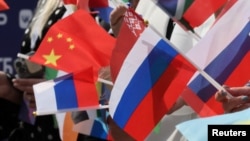Russian musicians have been unwelcome on the stage of the Eurovision song contest since Moscow launched its full-scale invasion of Ukraine in 2022, but Russia is making sure they have a place to showcase their talent in a program steeped in Cold War nostalgia.
Russia is reviving Intervision, a Soviet-era song contest once intended to counter Eurovision. The organizers say at least 22 countries are set to take part in the contest, which they say will be a celebration of culture. Critics, however, see it as an attempt to resurrect a geopolitical tool designed to entertain those who yearn for a return of Russia's Cold War influence.
Intervision was first held in Czechoslovakia from 1965 to 1968 as the cultural face of the International Radio and Television Organization (OIRT) -- an East European network of radio and television broadcasters.
The event was promoted as a socialist alternative to Eurovision, and while it never rivaled the other contest’s popularity, it carried political weight, projecting the supposed solidarity of the Warsaw Pact.
It was first revived in Poland in 1977 and came to an end in 1980 amid Poland’s economic crisis and the rise of the Solidarity movement.
When the hirsute Austrian drag queen Conchita Wurst won Eurovision in 2014, Russian authorities announced plans to revive the competition as "an alternative to bearded Eurovision" but nothing came of it.
Now, however, Intervision is back, after Russian President Vladimir Putin ordered its return by decree in February.
It has been framed by Russian officials as a way to promote “international cultural and humanitarian cooperation,” although critics argue that the revival is less about music than about projecting Moscow’s influence abroad.
'Spiritual Values'
Deputy Prime Minister Dmitry Chernyshenko is chairing the organizing committee, while Sergei Kiriyenko, first deputy head of the presidential administration, is supervising the process.
The final will be held at the Live Arena in Novoivanovskoye, just outside Moscow, on September 20.
Chernyshenko said earlier that "the main condition for participating countries is to share our spiritual values."
However, Mikhail Shvydkoi, Putin's envoy on international cultural cooperation, said later that Intervision was open for contestants from “nonfriendly countries,” as well.
Still, most of the countries participating in the final reflect Moscow's geopolitical alignment.
Besides Russia, they are Belarus, Brazil, China, Colombia, Cuba, Egypt, Ethiopia, India, Kazakhstan, Kenya, Kyrgyzstan, Madagascar, Qatar, Saudi Arabia, Serbia, South Africa, Tajikistan, the United Arab Emirates, Uzbekistan, Venezuela, and Vietnam.
For the Kremlin, the participation of US performer Brandon Howard from Los Angeles was an apparent propaganda coup, allowing Moscow to argue that Intervision was more inclusive than Eurovision. But Howard withdrew at the last minute citing unspecified family reasons.
'Contemporary Realities'
On September 16, Russian Foreign Minister Sergei Lavrov, accompanied by Chernyshenko, Kiriyenko, and Konstantin Ernst, the director-general of Russia's state-owned Channel One TV station, held a press conference in Moscow, calling Intervision "a platform for strengthening mutual understanding and cultural ties."
For many who grew up in the Soviet Union and Eastern Europe during the Cold War, some of the statements at the event were reminiscent of the communist-era leaders, with officials taking a swipe at Western values.
"We are reviving the Soviet-era Intervision, yet we must account for contemporary realities," Lavrov said.
He later spoke of the importance of what he called "platforms free from discrimination or the imposition of modern reinterpretations," pointedly referencing the Paris Olympics opening ceremony, which included a camp-style reimagining of Leonardo da Vinci's The Last Supper with drag performers that sparked criticism from conservative and religious groups.
"We are happy that the performers at Intervision will just represent their countries in a way how their parents brought them up and how God created them," Lavrov added.
Kiriyenko stated that Intervision was "open for everybody," claiming that many of the artists from other countries who wanted to take part were unable to do so due to "political restrictions."
"Their choices did not coincide with opinions of the corresponding countries' leaders," Kiriyenko said without elaborating.
'Geopolitical Logic'
US-based Kazakhstan-born music blogger Andrei Litvinov told RFE/RL that "the geopolitical logic of Intervision looks clear."
"Like the Soviet Union in the past, today's Russia is again at odds with the West, this time over its aggression against Ukraine. After being excluded from Eurovision in 2022 over the war, Russia lost one of Europe's most visible platforms of its cultural presence," he said.
According to Litvinov, reviving Intervision as an instrument of soft power "allows Moscow to position itself as a cultural leader for an alternative bloc, representing some former Soviet republics and the countries of the Global South."
Well-known Russian cultural critic and music expert Artemy Troitsky, who is currently living in self-imposed exile in Estonia, told Current Time that the idea of restoring the Cold War-era music contest "is just another reminder that Putin's Russia of today has fallen back into 'Sovok' [the Soviet mindset and mentality]."
Troitsky added that, in a country plagued by corruption, Russia’s hosting of Intervision could create opportunities for the mismanagement or misuse of millions of dollars in government funds allocated for the event.











